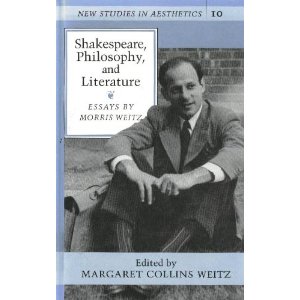Great Throughts Treasury
This site is dedicated to the memory of Dr. Alan William Smolowe who gave birth to the creation of this database.

Morris Weitz
American Aesthetician, Professor of Philosophy at Brandeis
"‘Art’, itself, is an open concept. New conditions (cases) have constantly arisen and will undoubtedly arise; new art forms, new movements will emerge, which will demand decisions on the part of those interested, usually professional critics, as to whether the concept should be extended or not."
"The very expansive, adventurous character of art, its ever-present changes and novel creations, makes it logically impossible to ensure any set of defining properties."
"We must start with the temporal, the ever-changing experience; and come to see its dependence upon the Timeless."
"Meaning, too, is reconstrued. Instead of tying it to object reference, it is regarded, at least in its primary sense of “the meaning of an expression ‘X’” as the rules, regulations, and conventions governing the use of an expression. To understand the meaning of an expression, then, is not to become acquainted with the object for which it stands, but to learn and be able to apply the criteria for its correct use. Meaning, thus, is not a relation or relational fact at all."
"The present and the past are perhaps already part of the future but the future is determined by the past. In this sense, all temporal experiences are in the present, at every moment, and we cannot redeem the temporal because it is never away from us to be redeemed. Also, and this becomes clear in the total context, 'All time is unredeemable' has another meaning: There is no redemption if we recognize only the flux. Further, even the realm of pure possibilities, of things that might have happened, is no different from the temporal: Past, present, future and possibility point to one end which is always with us; that is, which end, as the Eternal or Timeless, immanent in the flux, is the ultimate source of explanation of it."
"The distinction between the Timeless and the temporal becomes the distinction between The Word and words. Words lie, but it is only through words that we can conquer them, to express the truth which is The Word. And what we want to say we cannot say because words are always changing, being in the flux; but even with words we can suggest The Word: That God, Who is the Final. Cause, did initiate the first event and does determine the last event."
"Criticism is many things, not just one. That is, it is more than one procedure, or set of doctrines, or tissue of disagreements. Its multiple character is guaranteed at least by its range: from description to interpretation, explanation, evaluation, poetics, and aesthetics. Even at this early stage of our enquiry, consequently, we can say (truly) that criticism, as practised by the critics of Hamlet, is a combination of and the choice among many different activities. Hence, criticism is not merely a valuation, interpretation, explanation, or elucidation, as some philosophers and many critics-in their unfortunate moments of monism-wont to claim."
"It is difficult to see just how a metaphysical statement about tragedy or the nature of man, or an aesthetic statement about the nature of drama can be established as true. It is equally difficult to understand how one could substantiate a particular method or category of explanation as the true or best one. There is nothing logically self-evident or metaphysically or empirically true that could establish the claim that psychology, metaphysics, intellectual or dramatic history, myth and ritual, imagery, symbolism, poetry, organic unity, or any other category, is a correct and best one with which to approach and explain Hamlet."
"Indeed, the history of dramatic criticism, including criticism of the plays of Shakespeare, is in great part the history of unresolved disagreement over the necessary and sufficient properties of dramatic greatness. If there are such properties, then, we must nevertheless admit that no one has ever stated satisfactorily what they are."
"What is poetics? Traditionally, it is the determination of the fundamental principles of one or other of the arts or species of them. What is the nature of literature, painting, sculpture, music, architecture, drama, dance or, latterly, the motion picture? What is poetry, drama, or tragedy? These are among the questions traditionally associated with poetics."
"I have argued that there is no true poetics of tragedy, that there cannot be such a poetics, and that there need not be in order to guarantee the cogency of the reasons. I have also argued that poetics, unlike description, explanation, and evaluation, is an illegitimate procedure of criticism in that it tries to define what is indefineable, to state the necessary and sufficient conditions of a functioning of a concept whose very functioning shows that it has and can have no such conditions."